Searching for something new to help transform your diet? Look no further than flaxseeds!
I know, I sound like a spokesperson for the flaxseed lobby already, but these little guys seriously pack a nutritious punch.
Flaxseeds come from the flax plant, an annual herb used as both food and medicine for thousands of years, and its health benefits have been speculated about ever since their first introduction to our diets.
But recently, modern medicine has begun generating an ever-increasing amount of promising research into their effects.
So, here we have a natural product with a huge history of use that is also tasty and dense with nutrients? Count me in.
Let’s explore the facts about flaxseeds.
What’s in Flaxseed?
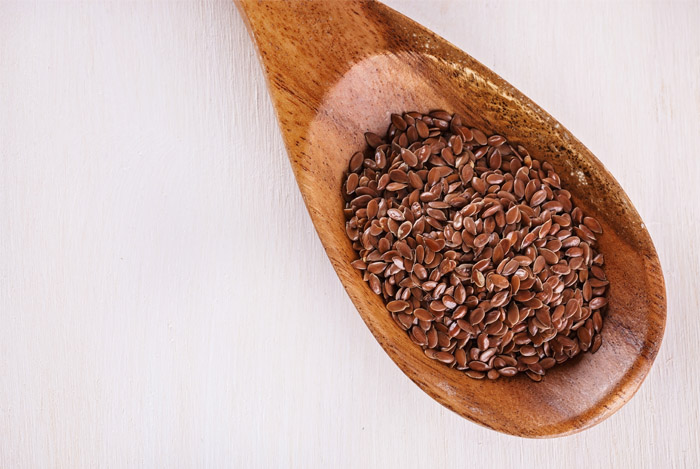 Touted as a wonder food, whole flaxseeds and their derivatives (ground, crushed, milled, linseed oil) are a source of a bounty of important nutrients.
Touted as a wonder food, whole flaxseeds and their derivatives (ground, crushed, milled, linseed oil) are a source of a bounty of important nutrients.
They’re an excellent source of vitamin E, the B complex vitamins including riboflavin, niacin, thiamin, B6, and folate, and minerals like manganese, potassium, calcium, iron, magnesium, zinc, selenium, and more.
Flaxseed is also high in something called mucilage gum, a water soluble gel-forming fiber with intestinal health benefits.
Omega-3 Fatty Acids
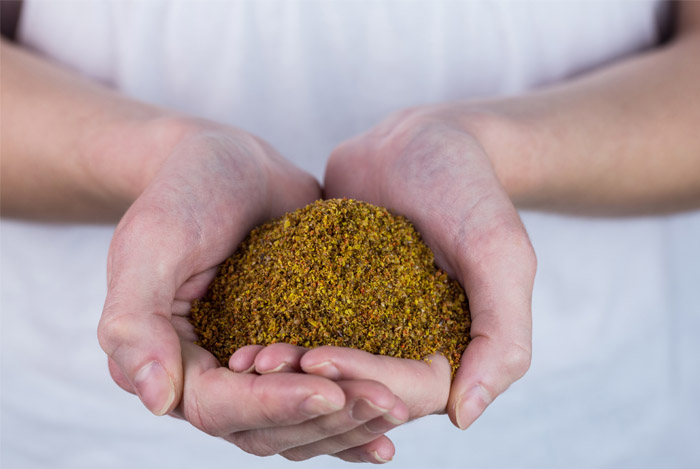 Some nutritionists credit omega-3 fatty acid deficiencies to a whole host of common diseases, largely due to the marvelous anti-inflammatory effects they have when present in full force.
Some nutritionists credit omega-3 fatty acid deficiencies to a whole host of common diseases, largely due to the marvelous anti-inflammatory effects they have when present in full force.
Amazingly, flaxseeds contain more alpha-linoleic acid (ALA) omega-3 fat than any other food source.
So, if you consume flaxseed regularly, you’ll be taking the best action you can take against:
- Skin inflammation like acne, eczema, and psoriasis
- Asthma and other respiratory problems
- Macular degeneration
- Cardiovascular problems like heart disease
- Joint inflammation like gout, arthritis, and lupus
One tablespoon of ground flaxseed contains 2 grams of polyunsaturated fatty acids. Two tablespoons contain more than 100% of your recommended daily intake for these heart healthy fats.
This can help improve digestive health and relieve constipation, as well as lower total blood cholesterol including “bad” low-density lipoprotein cholesterol levels.
Why are omega-3s so important? Because the human body can’t make them on its own.
These fats are so important because of their integral role in strengthening cell membranes, making hormones that regulate blood clotting, and aiding in the contraction and relaxation of artery walls.
Lignans
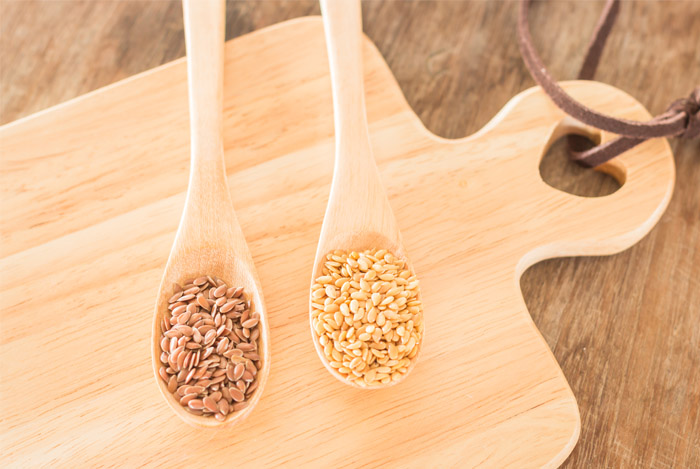 One of the key factors that sets flaxseed apart from other sources of beneficial nutrients is the high levels of a substance collectively known as lignans.
One of the key factors that sets flaxseed apart from other sources of beneficial nutrients is the high levels of a substance collectively known as lignans.
Lignans are a phytoestrogen – a plant compound with a chemical structure similar to human estrogen. They’re part of the dietary fiber present in flaxseeds, and can be found in higher levels than most other foods.
In fact, flaxseeds contain around 300,000 micrograms of lignans per 100 grams. The next closest food source of lignans, sesame seeds, have only 29,000 micrograms per hundred grams. You read that right; flaxseed contains ten times the amount of lignans as the next highest edible source.
Why are they so awesome? Experiments have demonstrated “clear anticarcinogenic effects of flaxseed or pure lignans in many types of cancer”.
They also have marked effects on your cardiovascular system, preventing breast cancer, and can even act as antioxidants, protecting your cells from dangerous free radicals that damage your DNA and cell membranes.
Health Benefits
Alright – now that we know what’s in flaxseeds, let’s dive right in to the health benefits.
Digestive Health
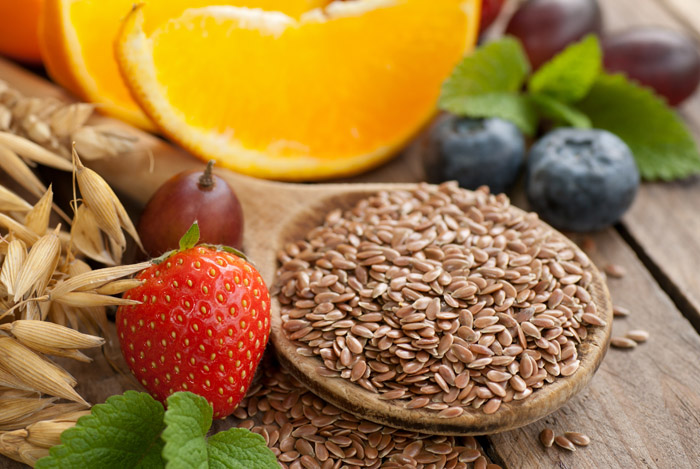 Flaxseed contains 8 grams of fiber per serving. The recommended daily intake of fiber is anywhere from 25 to 38 grams.
Flaxseed contains 8 grams of fiber per serving. The recommended daily intake of fiber is anywhere from 25 to 38 grams.
Because of their strong dietary fiber content, flaxseeds help to delay gastric emptying (meaning, you’ll hold the food you consumed longer in your digestive tract), which leads to more efficient absorption of nutrients by your intestines.
The fiber in flaxseed has been used for millennia, by Hippocrates for relief of intestinal discomfort and even by Charlemagne who passed laws requiring its consumption by his subjects. Thanks to how well it reduces gut inflammation, it’s now been shown to help Crohn’s disease sufferers.
Present in flaxseed are both soluble and insoluble fibers, helping to steady the passage of food through the intestines. The mucilage in flaxseed supports colon detoxification, fat loss, and a reduction of sugar cravings.
Heart Health
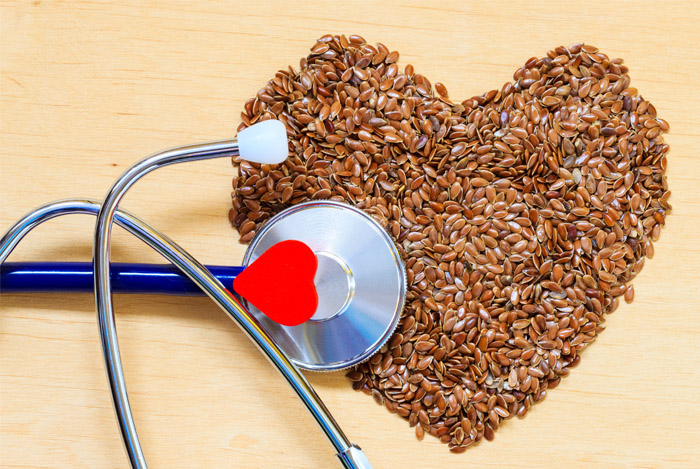 The Centers for Disease Control and Prevention (CDC) report that nearly 1 in 3 Americans suffer from high blood pressure, also known as hypertension. Only about half have their condition under control.
The Centers for Disease Control and Prevention (CDC) report that nearly 1 in 3 Americans suffer from high blood pressure, also known as hypertension. Only about half have their condition under control.
When left untreated, high blood pressure can lead to numerous problems, increasing your risk for a heart attack, kidney disease, stroke, or vascular dementia.
So, if eating flaxseeds was proven to help lower high blood pressure, wouldn’t you be sold on their nutritional value?
A study published in the European Journal of Clinical Nutrition (EJCN) showed that they could do just that. Through observing 59 middle aged men over the course of 12 weeks, they discovered that regular flaxseed oil consumption could significantly reduce blood pressure readings, without their having to change the quantity or quality of their existing diet.
Further research has shown that the various forms of flaxseed – ground, defatted, flaxseed bread and muffins – help to reduce total cholesterol and “bad” cholesterol.
Studies on omega-3 fatty acid alpha-linoleic acid intake and its effects on decreasing high blood pressure and cholesterol make it obvious how helpful it can be, and as such a powerful source of omega-3s, flaxseed and flaxseed oil are excellent for heart health.
Diabetes control
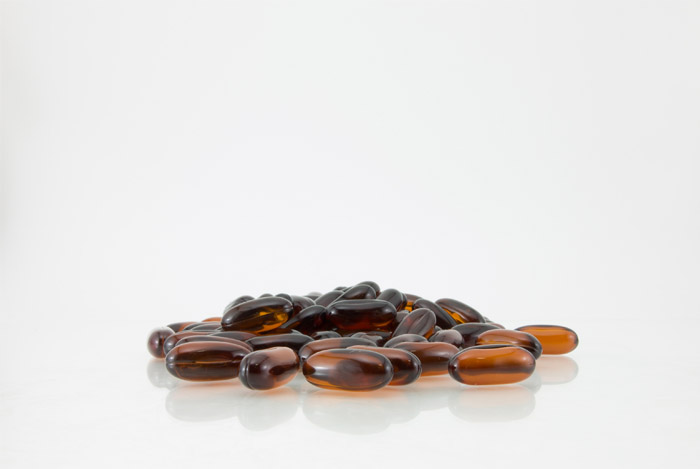 Diabetes is the result of the body being inadequately equipped to produce or respond properly to insulin, the hormone used to control blood glucose levels.
Diabetes is the result of the body being inadequately equipped to produce or respond properly to insulin, the hormone used to control blood glucose levels.
Diabetics often look for foods and supplements they can take to help lower their blood glucose levels more effectively, and flaxseed may be one of their best bets for doing so.
A study performed in 2007 by the Public Library of Science One (PLoS One) found that sufferers of type 2 diabetes who consumed flaxseed-derived lignin supplements for 12 weeks reported lower average blood glucose levels.
Weight Loss and Diet
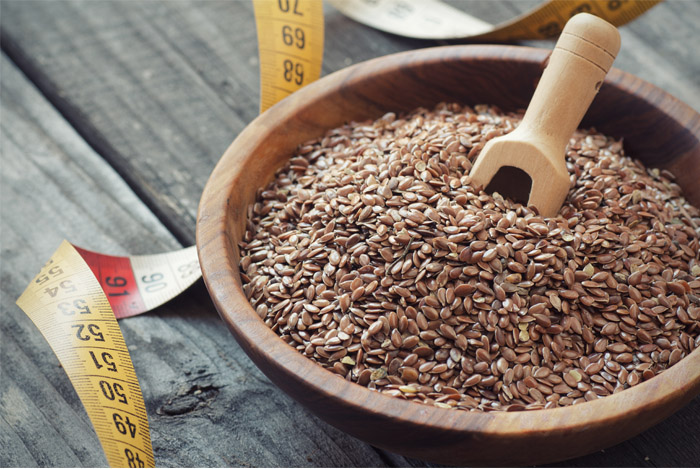 A serving of flaxseed only contains 75 calories, along with 5.9 grams of fat, 3.8 grams of dietary fiber, and 2.6 grams of protein. You’re receiving all the health benefits at a very low caloric cost.
A serving of flaxseed only contains 75 calories, along with 5.9 grams of fat, 3.8 grams of dietary fiber, and 2.6 grams of protein. You’re receiving all the health benefits at a very low caloric cost.
A 2012 Harvard University study found that participants who ate flaxseed, lost 37 percent more weight than participants who did not. This is thought to be the result of the promotion of feelings of fullness caused by the high fiber content of flaxseed.
And, people who take on a vegan or vegetarian diet often have to supplement for protein and omega-3 fatty acids they would otherwise have found in fish or meat products, but flaxseed (also gluten free) can be used safely and without any of those ethical, moral, or general health concerns.
Liver disease prevention

Other than your drinking habit on weekends, you may lead a healthy lifestyle. And yes, it’s a seriously destructive habit for your entire well-being, but one of the more alarming effects of alcoholism is how much it increases your chances of liver disease.
However, there may be ways of lowering your chances of liver disease by eating flaxseeds. Please note: this is not a recommendation for you to continue drinking heavily. I’m purely putting the research out there – do with it what you will.
Recent research found that in 30 men who took flaxseed supplements, liver disease factors were significantly reduced – concluding that the consumption of flaxseed derivatives, and indeed flaxseed itself, could be beneficial in this area.
Still, it might just be better if you stopped all the drinking. Just saying.
Prevent kidney and auto-immune disease
 There is abundant evidence that the plant proteins found in flaxseed can slow the development and progression of chronic renal disease, or kidney failure, in animals.
There is abundant evidence that the plant proteins found in flaxseed can slow the development and progression of chronic renal disease, or kidney failure, in animals.
This is most likely due to the high levels of lignans found in flaxseed. Research found that administering lignin supplements alone for 22 weeks in mice delayed the onset of proteinuria – abnormal quantities of protein in the urine – which can help stave off kidney damage and disease.
Lupus, a chronic inflammatory disease that occurs when the body’s immune system attacks itself, damaging the organs and tissues including the kidneys, joints, skin, brain, blood cells, heart, and lungs, can be treated by regularly eating flaxseeds.
This is again because of the omega-3 fatty acid known as ALA, along with the high lignan content. Research concluded that a diet containing high levels of flaxseed was good for the body because of its benefits for renal function, and anti-inflammatory mechanisms that lead to lupus.
Cancer prevention

A lot of us would love to have a fantastic tan, but we fear the dangers of skin cancers caused by sitting or standing for too long in a tanning bed. And rightly so, as lots of research into indoor tanning has demonstrated a clear link to increased risk of melanoma.
But if you can’t find another method of getting rid of your pasty appearance and choose to go with the indoor tanning option, or are lucky enough to have a nice beach nearby to get your skin a few shades darker, don’t forget your flaxseeds.
Researchers have shown flaxseed to help reduce the risk of melanoma tumors from metastasizing by as much as 63%, and to inhibit the growth of already present tumors in animals. So stay smart and save your skin by consuming flaxseed regularly.
Flaxseed is also thought to prevent prostate, colon, and breast cancers, largely due to its high omega-3 fatty acid content. Omega-3s disrupt cancerous, malignant cells from being able to cling onto other cells of the body.
According to a study by the American Society of Clinical Oncology, if you already have prostate cancer developing in your body, consuming flaxseed can stop your tumors from growing.
Thanks to their antiangiogenic properties, the lignans present in flaxseed also stop tumors from forming new blood vessels by interfering with cell division.
How should you eat flaxseed?
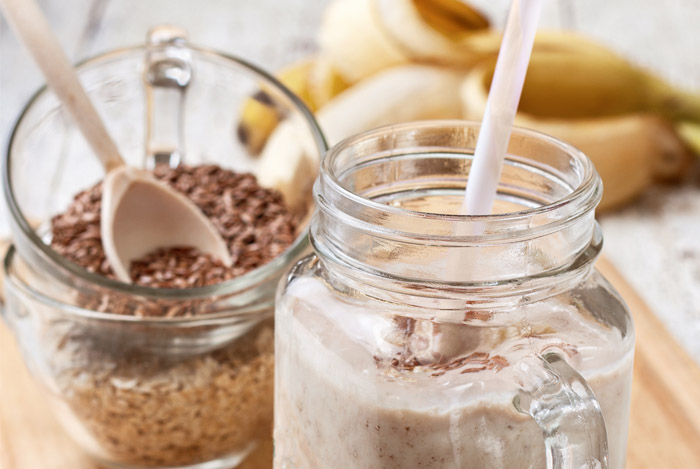 Like I mentioned at the beginning, flaxseed can come in a few different forms. You may be wondering, which one contains the most health benefits?
Like I mentioned at the beginning, flaxseed can come in a few different forms. You may be wondering, which one contains the most health benefits?
Most experts tend to recommend ground over whole flaxseed. The ground form is much easier for your body to digest, as the whole flaxseed itself might actually pass through your intestine undigested. If that happened, you wouldn’t be getting most of the awesome benefits I’ve listed.
The seed can be purchased in bulk in grocery or health food stores. If you happen to only find the whole seeds, you can grind them in a coffee grinder and store them in an airtight container. To keep the whole seeds fresh, you might keep them in your refrigerator.
Flaxseeds can be used in a number of ways in different foods and meals to add flavor, texture, and health benefits, including:
- Greek yogurt
- Applesauce
- Pumpkin bread
- Oatmeal
- Muffins
- Smoothies and shakes
- Chicken (sprinkled on top)
- Granola bars
- Breakfast cereal
When eating flaxseed, just like with any other source of high fiber, you should drink plenty of fluids to maximize its digestive benefits.
Conclusion
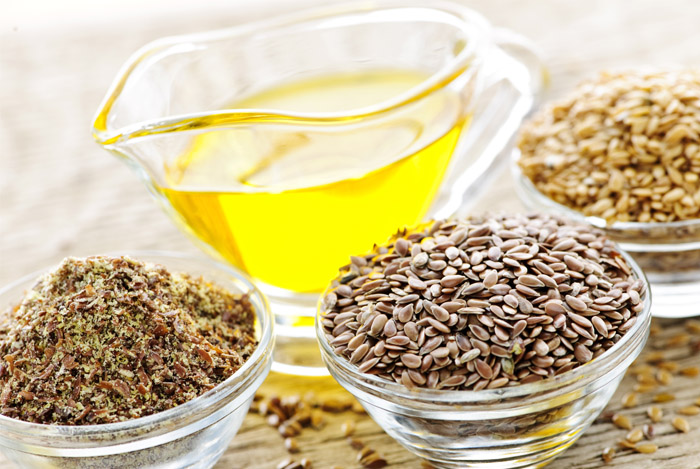 Yet again, another food has proven worthy of inclusion in a well-balanced diet. And I’ll tell you, flaxseed has really knocked it out of the park by being both incredibly beneficial and super versatile.
Yet again, another food has proven worthy of inclusion in a well-balanced diet. And I’ll tell you, flaxseed has really knocked it out of the park by being both incredibly beneficial and super versatile.
Before I forget, the only real word of caution I could issue is that, because the word is still out on just how magical it might be, some experts warn that pregnant women and breastfeeding mothers shouldn’t supplement their diets with flaxseed.
Of course, once all that research has come through and we have the final word on it, flaxseed still won’t be the ultimate solution to all your health problems. Some research still needs to be done on flaxseed to fully determine its benefits and find out if there are any real negatives to it before it can be considered a superfood.
Until then, I plan to enjoy experimenting with it in my diet as much as possible.
Have you experienced the benefits of flaxseed? Share your story in the comments below!
The post 7 Health Benefits of Flaxseeds to Help You Live Longer appeared first on Nutrition Secrets.
http://www.nutritionsecrets.com/health-benefits-of-flaxseeds/
No comments:
Post a Comment